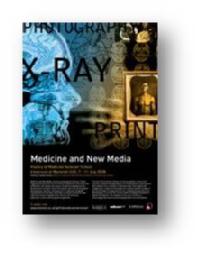Summer School 2008: Medicine and New Media
When: 7-11 July
Where: University of Warwick, Coventry, UK
Participants: Professor Peter Abrahams (Warwick Medical School), Dr Andrea Carlino (Institute de l’histoire de medicine, Geneva), Professor Gemma Calvert (Engineering, Warwick), Pippa Chadfield (Primal Pictures), Dr Monika Dommann (Universitat Zurich), Dr Mechthild Fend (UCL), Professor Sander Gilman (Emory), Dr Sachiko Kusukawa (Oxford), Molly Rogers (Writer and Independent Scholar), Dr Michael Sappol (National Library of Medicine, Bethesda, MD, USA), Dr William Schupback (Wellcome Library), Dr Fernando Vidal (Max-Planck-Institute for the History of Science, Berlin), Phillip Warnell (Interdisciplinary Artist)
Medicine and New Media, the first postgraduate Summer School organized by the Centre for the History of Medicine at the University of Warwick explored the history of medical imaging from the Renaissance to present times. Participants traced technological developments and their consequences in medicine, alongside consideration of how these new ways of ‘seeing’ the human body reflected and were shaped by the concerns of scientists, physicians, artists, and the general population.
The aim of the Summer School was to bring together current and recently completed postgraduates from the humanities and sciences with experts from a number of different fields to engage with a range of technologies for making scientific images of the human body, including the fine arts, drawing and painting, as well as film, photography, X-ray and the current medical imaging techniques of digital biomedicine. Moreover, it addressed itself to students who are investigating questions about the meaning of images of the human body and how agreement about such meaning is negotiated (in the laboratory, in modern mass-media, public displays in museums, in university anatomy teaching). What are the epistemological, moral and philosophical consequences of our desire to picture all functions of the human body? What does it mean to be human in a world of global mass media in which the individual body is central, yet increasingly public and commercialised? Are there alternatives to the understanding in Western science since the nineteenth century that vision is the primary avenue to knowledge and sight takes precedence over the other senses as a tool in the analysis of living things?
The emphasis of the course was on encouraging discussion and exchanging ideas across disciplinary boundaries. The participants met every morning with two experts to discuss the topic of the day. The afternoon was reserved for activities related to the theoretical issues discussed in the morning such as digital anatomy, scanning, and photography sessions etc. A background reading pack was sent to each participant in advance.
We were delighted that Professor Sander Gilman (Distinguished Professor of the Liberal Arts and Sciences, Emory University, USA), has been named a Visiting Fellow by the Institute of Advanced Study at Warwick, enabling him to be in residence at Warwick for the duration of the Summer School. In addition to bringing his expertise to bear upon discussion throughout the Summer School sessions and activities, Professor Gilman gave a keynote lecture on the opening night of the School.

